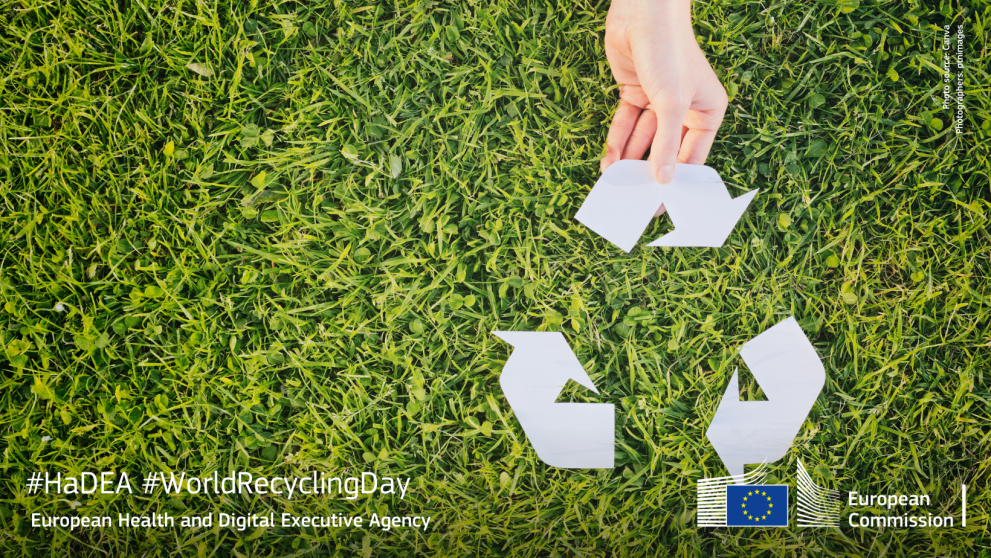
World Recycling Day is celebrated annually on 18 March, and its objective is to raise awareness about how recycling is urgently needed to protect our planet.
The European Commission adopted a European strategy for plastics as part of the circular economy action plan, and builds on existing measures to reduce plastic waste. This plastics strategy aims at protecting our environment by minimising marine litter, greenhouse gas emissions and reducing dependence on imported fossil fuels. Additionally, it will support more sustainable and safer consumption and production patterns for plastics.
The challenges
Plastics materials are produced mainly from raw materials of fossil origin (e.g. PE - polyethylene, PP - polypropylene, and PET - polyethylene terephthalate). A variety of bio-based plastic materials are increasingly available. Plastic materials are used in a wide range of applications because of their properties, versatility, lightweight and price.
The wide use of these materials results in a huge amount of plastic waste. Recycling and redesign of plastics are crucial to reuse plastic waste material and avoid landfill. This also allows using plastics as carbon sinks in an optimal way, before using them for energy recovery at the end of their life cycle.
A major challenge lies in the development of process technologies, utilising plastic waste as starting material (at least partly). A better use of underexploited resource (plastic waste) for the production of added value products – not restricted to plastics but excluding fuels – and process streams would support the circular economy.
The projects
Discover how some of the Horizon 2020 projects managed by HaDEA address these challenges:
- MMAtwo: the main goal of the MMAtwo project is to create a new value chain for PMMA (PolyMethylMethAcrylate) depolymerisation. How are they doing it? Using depolymerisation to convert difficult-to-recycle waste, which would otherwise be landfilled or incinerated into high quality secondary raw material. MMAtwo’s target is to reduce the energy needs by more than 70% and CO2 emissions by more than 60%.
- UPLIFT: following a bio-refinery approach, the aim of the project is to biologically depolymerize bio and fossil-based plastic packaging waste, and convert it into more renewable and easily upcyclable polymers. Instead of using virgin fossil-based monomers, UPLIFT will upcycle (currently not recycled) plastic packaging waste and integrate bio-based building blocks. It will result in the conservation of natural resources, reduction of plastic packaging waste generation and of greenhouse gas emissions associated with fossil-based production as well.
- TERMINUS: the project addresses the challenge of unlocking recycling and reuse of flexible multi-layer and multi-compounds packaging materials used for food, beverages, cosmetics, pet food, fertilisers, and any perishable goods in general. It will develop a range of smart enzyme-containing polymers with triggered intrinsic self-biodegradation properties, acting as adhesives or tie layers in the design and manufacturing of multi-layer plastics for food and non-food applications. The technology will be applied to biodegradable PUR-based adhesives for adhesive lamination and extrusion coating lamination, and polymers and tie layers (PBS, PLA, PPC or PCL) in blown extrusion.
- MultiCycle: this project will deliver an industrial recycling pilot plant for fossil and bio-based thermoplastic multilayer packaging and fibre reinforced composites. They will do so by using a novel solvent-based selective extraction process which allows to recover pure plastics and additives in mixed wastes for their later reprocessing into value-added applications.
- PolynSPIRE: their main objective is to demonstrate a set of solutions, aiming at improving the energy and resource efficiency of post-consumer and post-industrial plastic recycling processes, targeting 100% waste streams containing at least 80% of plastic materials. With three innovation pillars:
- Chemical recycling assisted by microwaves and smart magnetic catalysts as a path to recover plastic monomers and valuable fillers (carbon or glass fibres).
- Advanced additivation and high energy irradiation to enhance recycled plastics quality.
- Valorisation of plastic waste as carbon source in steel industry.
Background information
Details
- Publication date
- 18 March 2022
- Author
- European Health and Digital Executive Agency
- Programme Sector
- Industry
- Programme
- Horizon Europe
- Tags
- EUFunded
- Industrial research
- Raw material
